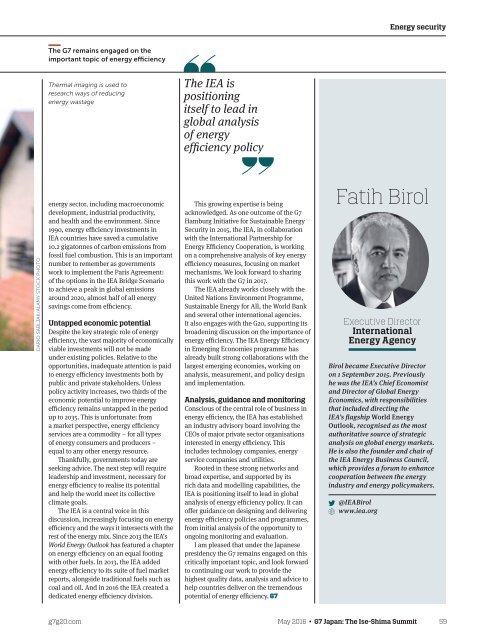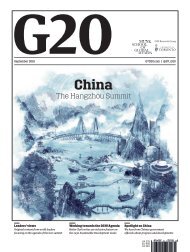G7_JAPAN
You also want an ePaper? Increase the reach of your titles
YUMPU automatically turns print PDFs into web optimized ePapers that Google loves.
Energy security<br />
The <strong>G7</strong> remains engaged on the<br />
important topic of energy efficiency<br />
Thermal imaging is used to<br />
research ways of reducing<br />
energy wastage<br />
The IEA is<br />
positioning<br />
itself to lead in<br />
global analysis<br />
of energy<br />
efficiency policy<br />
DARIO SABLJAK/ALAMY STOCK PHOTO<br />
energy sector, including macroeconomic<br />
development, industrial productivity,<br />
and health and the environment. Since<br />
1990, energy efficiency investments in<br />
IEA countries have saved a cumulative<br />
10.2 gigatonnes of carbon emissions from<br />
fossil fuel combustion. This is an important<br />
number to remember as governments<br />
work to implement the Paris Agreement:<br />
of the options in the IEA Bridge Scenario<br />
to achieve a peak in global emissions<br />
around 2020, almost half of all energy<br />
savings come from efficiency.<br />
Untapped economic potential<br />
Despite the key strategic role of energy<br />
efficiency, the vast majority of economically<br />
viable investments will not be made<br />
under existing policies. Relative to the<br />
opportunities, inadequate attention is paid<br />
to energy efficiency investments both by<br />
public and private stakeholders. Unless<br />
policy activity increases, two thirds of the<br />
economic potential to improve energy<br />
efficiency remains untapped in the period<br />
up to 2035. This is unfortunate: from<br />
a market perspective, energy efficiency<br />
services are a commodity – for all types<br />
of energy consumers and producers –<br />
equal to any other energy resource.<br />
Thankfully, governments today are<br />
seeking advice. The next step will require<br />
leadership and investment, necessary for<br />
energy efficiency to realise its potential<br />
and help the world meet its collective<br />
climate goals.<br />
The IEA is a central voice in this<br />
discussion, increasingly focusing on energy<br />
efficiency and the ways it intersects with the<br />
rest of the energy mix. Since 2013 the IEA’s<br />
World Energy Outlook has featured a chapter<br />
on energy efficiency on an equal footing<br />
with other fuels. In 2013, the IEA added<br />
energy efficiency to its suite of fuel market<br />
reports, alongside traditional fuels such as<br />
coal and oil. And in 2016 the IEA created a<br />
dedicated energy efficiency division.<br />
This growing expertise is being<br />
acknowledged. As one outcome of the <strong>G7</strong><br />
Hamburg Initiative for Sustainable Energy<br />
Security in 2015, the IEA, in collaboration<br />
with the International Partnership for<br />
Energy Efficiency Cooperation, is working<br />
on a comprehensive analysis of key energy<br />
efficiency measures, focusing on market<br />
mechanisms. We look forward to sharing<br />
this work with the <strong>G7</strong> in 2017.<br />
The IEA already works closely with the<br />
United Nations Environment Programme,<br />
Sustainable Energy for All, the World Bank<br />
and several other international agencies.<br />
It also engages with the G20, supporting its<br />
broadening discussion on the importance of<br />
energy efficiency. The IEA Energy Efficiency<br />
in Emerging Economies programme has<br />
already built strong collaborations with the<br />
largest emerging economies, working on<br />
analysis, measurement, and policy design<br />
and implementation.<br />
Analysis, guidance and monitoring<br />
Conscious of the central role of business in<br />
energy efficiency, the IEA has established<br />
an industry advisory board involving the<br />
CEOs of major private sector organisations<br />
interested in energy efficiency. This<br />
includes technology companies, energy<br />
service companies and utilities.<br />
Rooted in these strong networks and<br />
broad expertise, and supported by its<br />
rich data and modelling capabilities, the<br />
IEA is positioning itself to lead in global<br />
analysis of energy efficiency policy. It can<br />
offer guidance on designing and delivering<br />
energy efficiency policies and programmes,<br />
from initial analysis of the opportunity to<br />
ongoing monitoring and evaluation.<br />
I am pleased that under the Japanese<br />
presidency the <strong>G7</strong> remains engaged on this<br />
critically important topic, and look forward<br />
to continuing our work to provide the<br />
highest quality data, analysis and advice to<br />
help countries deliver on the tremendous<br />
potential of energy efficiency. <strong>G7</strong><br />
Fatih Birol<br />
Executive Director<br />
International<br />
Energy Agency<br />
Birol became Executive Director<br />
on 1 September 2015. Previously<br />
he was the IEA’s Chief Economist<br />
and Director of Global Energy<br />
Economics, with responsibilities<br />
that included directing the<br />
IEA’s flagship World Energy<br />
Outlook, recognised as the most<br />
authoritative source of strategic<br />
analysis on global energy markets.<br />
He is also the founder and chair of<br />
the IEA Energy Business Council,<br />
which provides a forum to enhance<br />
cooperation between the energy<br />
industry and energy policymakers.<br />
@IEABirol<br />
www.iea.org<br />
g7g20.com May 2016 • <strong>G7</strong> Japan: The Ise-Shima Summit 59
















